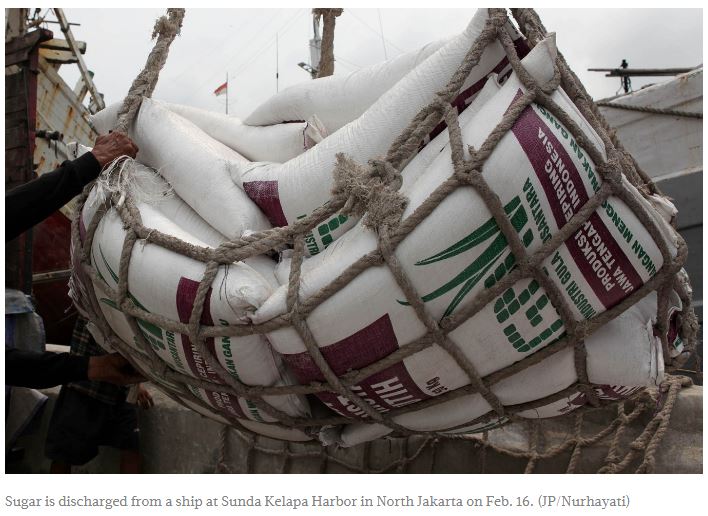Indonesia may import extra 130,000 tons of sugar from India to meet demand
Indonesia may obtain more sugar from India to gratify domestic needs as local supplies are unlikely to be sufficient to meet demand this year.
The Food Resilience Agency (BKP) has proposed to import 130,000 tons of white crystallized sugar to offset a delayed milling period due to severe drought in 2019, agency head Agung Hendriadi said on Thursday. The BKP is currently awaiting a coordination meeting at the Coordinating Economic Ministry to approve the measure.
“The sugar milling season will start in late June or early July. Usually, it occurs in May, but the long drought last year has pushed back the [sugarcane] planting season, thereby delaying the milling process,” Agung told reporters after a discussion with the Indonesian Chamber of Commerce and Industry (Kadin) in Jakarta.
According to the latest estimates from the Agriculture Ministry, white crystallized sugar consumption in the country stood at 2.8 million tons in 2019, while local production is projected to be around 2.2 million to 2.3 million tons. This leaves a space of around 500,000 tons for consumption-ready imported sugar if production is similar this year.
If approved, the proposed import could help prevent a price spike during the Idul Fitri holidays in May from a sugar supply shortage, as consumption typically skyrockets during the festivity, including sugar.
The import request follows Indonesia’s recent lobbying attempt to prioritize imports of raw sugar from India in return for lower tariffs imposed by India on crude palm oil from Indonesia.
Indonesia recently changed the color-grading standard known as the International Commission for Uniform Methods of Sugar Analysis (ICUMSA) from 1200 to 600 to allow raw sugar shipments from India. Most Indian mills make raw sugar with an ICUMSA of less than 800 and could not ship to Indonesia, which had a level for imported sugar of 1,200.
It also reduced import duties for Indian raw sugar to around 5 percent to further bolster the initiative.
“It’s a barter. We get their palm oil [export] access,” Agung said.
Earlier this month, the Coordinating Economic Ministry already agreed to import 495,000 tons of nonindustrial raw sugar from India to meet domestic demand.
The State Logistics Agency (Bulog) had proposed to import another 200,000 tons of sugar but had yet to specify an import source as of Thursday.
Meanwhile, India has expressed eagerness to resume shipments of its sugar to Indonesia after a long hiatus and a severe drought cut production in Thailand, normally the main supplier of raw sugar to Indonesia.
“This is a golden opportunity for us to export sugar to Indonesia,” said Prakash Naiknavare, managing director of the National Federation of Cooperative Sugar Factories Ltd., a producers group, as quoted by Bloomberg.
“Mills just need to shut white sugar production and start making raw [sugar] in the next two months before the crushing season is over.”
Indonesian Sugar Association (AGI) adviser Yadi Yusriadi told the Post that the BKP’s latest import suggestion was “normal” to stabilize prices ahead of the Idul Fitri holidays, as retail sugar prices had already reached around Rp 14,000 per kilogram as of Thursday, exceeding the government’s price ceiling of Rp 12.000.
He added that the short-term import setback would be less apparent than the yearly import quota, which has been blamed for threatening local producers with competitive prices and unfair practices.
Indonesian Sugarcane Farmers Association (APTRI) chairman Soemitro Samadikoen questioned the need for more imports, since prices had been “manageable” with the highest retail price (HET) pegged at Rp 12,500 per kg since 2016.
“This has been four years. Four years. How many times have the electricity prices increased? How many times have minimum wages increased? How [high] has inflation been?” Soemitro said.
“Does this country want to make its people prosperous or make them suffer instead? Is this [import plan] aimed at getting rid of sugarcane farmers, so they can continue to import?”
AGI executive director Budi Hidayat also cast doubt on the necessity of more imports from India, with both the Office of the Coordinating Economic Minister and Bulog having put forth import initiatives.
“The domestic prices could be under pressure if imports and supply are excessive, as [the price of the imported sugar] would be below the price ceiling,” Budi said.
Source: https://www.thejakartapost.com/news/2020/02/28/indonesia-may-import-extra-130000-tons-of-sugar-from-india-to-meet-demand.html


 English
English




